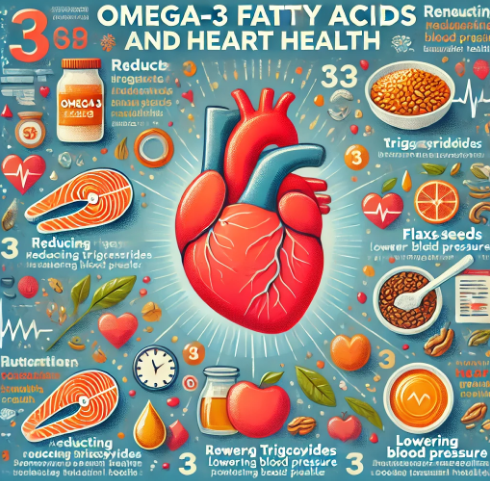Omega-3 fatty acids have gained widespread attention for their numerous health benefits, particularly for the heart. This article will focus on explaining how Omega-3 fatty acids can reduce the risk of heart disease, improve cholesterol levels, and lower blood pressure, while also offering suggestions on how to incorporate them into a daily diet.
Main Points to Cover:
- Introduction to Omega-3 Fatty Acids:
- What are Omega-3 fatty acids?
- The different types: ALA, DHA, and EPA.
- Cardiovascular Benefits:
- How Omega-3 helps in reducing triglycerides.
- Role in lowering blood pressure.
- Reducing the risk of arrhythmias and heart attacks.
- Sources of Omega-3 Fatty Acids:
- Fatty fish (e.g., salmon, mackerel).
- Plant-based sources (e.g., flaxseeds, chia seeds, walnuts).
- Omega-3 supplements.
- Recommended Daily Intake:
- General guidelines for Omega-3 consumption.
- Best practices for getting Omega-3 from diet vs supplements.
- Scientific Evidence and Studies:
- Summary of key studies linking Omega-3 to heart health improvements.
- Conclusion:
- Final thoughts on incorporating Omega-3 into a heart-healthy lifestyle.
Sources :
- Simopoulos, A. P. (2002). The Importance of the Omega-6/Omega-3 Fatty Acid Ratio in Cardiovascular Disease and Other Chronic Diseases. Experimental Biology and Medicine, 227(5), 361-369.
- Calder, P. C. (2015). Omega-3 Polyunsaturated Fatty Acids and Inflammatory Processes: Nutrition or Pharmacology? British Journal of Clinical Pharmacology, 75(3), 645-662.
- Kris-Etherton, P. M., Harris, W. S., & Appel, L. J. (2002). Fish Consumption, Fish Oil, Omega-3 Fatty Acids, and Cardiovascular Disease. Circulation, 106(21), 2747-2757.

